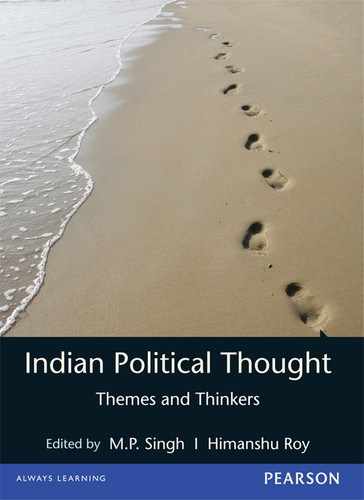Chapter 3
1. In the Tarikh-I Firuzshahi (henceforth Tarikh) and Fatawa-i-Jahandari (henceforth Fatawa) he refers to himself as Zia Barani rather than, Ziauddin Barani. For details, see Irfan Habib, ‘Barani’s Theory of The History of The Delhi Sultanate’ in the Indian Historical Review, Vol. VII, No. i-2, July 1980–January 1981, p. 1.
2. Mohammad Habib and Afsar Umar Salim Khan, The Political Theory of the Delhi Sultanate (Allahabad: Kitab Mahal, 1957), p. IV
3. See Irfan Habib, Essays in Indian History (henceforth Essays) (New Delhi: Tulika, 1995), p. 86.
4. See A. B. M. Habibullah, The Foundation of Muslim Rule in India (Allahabad: Central Book Depot, 1976), Chaps. V, VI, VII and VIII.
5. Irfan Habib, Essays, p. 151.
6. A. B. M. Habibullah, Chap. VIII.
7. Irfan Habib, Essays, p. 82.
8. Ibid., pp. 82–86.
9. Ibid., p. 86.
10. Barani regrets the end of Turks’ domination over the polity. See A. B. M. Habibullah, p. 165.
11. The civil functions proper began only from the end of the 13th century. Earlier, the state resembled more a military organization. See A. B, M. Habibullah, Chap. X.
12. Tarikh (ed. and trans.), Elliot and Dowson in The History of India as told by its own Historians, Vol. Ill. (Allahabad: Kitab Mahal, 1971), pp. 491–495, 499.
13. Fatawa (ed. and trans.) Mohammad Habib and Afsar Umar Salim Khan, pp.221–222, 219.
14. I. H. Qureshi, The Administration of the Sultanate of Delhi, (Patna: Oriental Book, 1979), pp.141–141.
15. A. B. M. Habibullah, op. cit., pp. 222, 246.
16. Irfan Habib, Essays, op. cit., p. 83.
17. A.B.M. Habibullah, op. cit., Chap. XV
18. I. H. Qureshi, op. cit. p.84; A. B. M. Habibullah, op. cit., pp.195–196.
19. Irfan Habib. Essays, p. 83; A. B. M. Habibullah, op. cit., p. 211.
20. Ibid.
21. A. B. M. Habibullah, op. cit., p. 213.
22. See Tapan Raychaudhuri and Irfan Habib (eds). The Cambridge Economic History of India, Vol. 1 (Cambridge University Press, 1982), p. 62; Irfan Habib, Essays, pp. 81–82.
23. K S. Lal, History of the Khajis (Delhi: Munsi Ram Manohar Lal, 1980), pp. 206–213.
24. Mohammad Habib and Afsar Umar Salim Khan, pp. 46–47; I. H. Qureshi, pp.157–161; A. B. M. Habibullah, p. 198.
25. A. B. M. Habibullah, Ibid., p. 226.
26. Ibid.
27. Ibid., p. 225.
28. Ibid., pp. 2, 224.
29. Irfan Habib, ‘Barani’s Theory of The History of The Delhi Sultanate’, op. cit., pp. 113–115.
